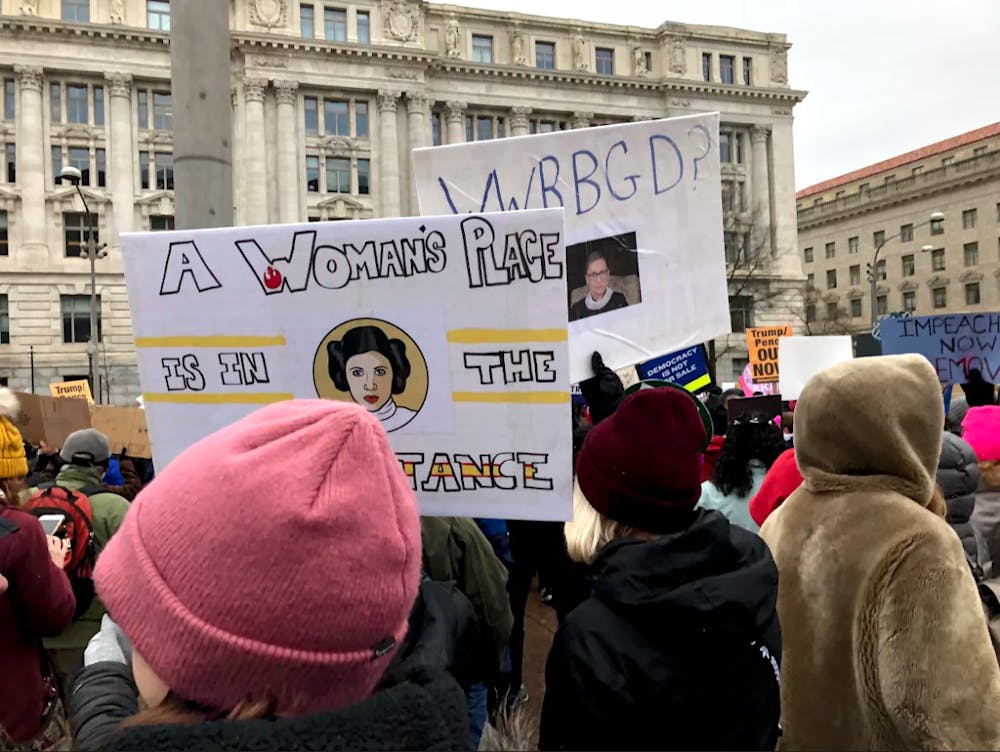Participants gathered at Freedom Plaza in Washington, D.C. for the fourth annual Women’s March on Jan. 18.
Speakers and marchers alike protested for collaboration between women around the world, the need to look past differences to unite against common enemies and for the end of U.S. President Donald Trump’s presidency.
Since the first Women’s March in 2017, which had over half a million participants in D.C., engagement has drastically declined.
Reports projected that only 10,000 people would participate in the 2020 March. Some believe this decrease in participation comes as a result of the issues between organizers of the event.
The Women’s March leadership was accused of anti-Semitism, and three founding members stepped down from their roles in 2019. However, the overall mission of the March has persevered.
In an interview with The News-Letter, senior Giuliana Lee recounted her excitement, as this was the first year she was able to attend the Women’s March in person.
“It’s so easy to just be an activist online and on social media, but there’s something more rewarding about physically lending your voice and being part of the crowd,” she said.
Participants stood on platforms and chanted “We need a leader, not a creepy tweeter!” and the succinct, “My body, my choice.”
In an email to The News-Letter, sophomore Mackie Smith wrote that she was thrilled to see so many people she knew.
“I saw Hopkins students at Union Station, on the Metro and at the March,“ she wrote. “I thought it was great that so many students were able to make it to D.C. and represent the Hopkins community outside of Baltimore.”
The keynote speaker for the event was Arndrea Waters King, who is married to Martin Luther King III, Martin Luther King Jr.’s son.
In her speech she didn’t mention specific issues with today’s political climate, but instead focused on supporting unity.
“This decade is the time to make real the promises of democracy... so that brotherhood and sisterhood will become more than a few utterances at the end of prayers, but a way of life and the first order of business on every legislative agenda,” she said.
She mentioned that 2020 marks the 100th anniversary of women gaining the right to vote.
However, Waters King emphasized that in addition to celebrating this centennial, women must also acknowledge that there is still a lot of work to do in the fight for equality.
“Remembering is not enough. We must use this milestone as a time of re-dedication and renewal,” she said.
Waters King spoke to the audience about the importance of defending the planet and protecting black communities in the U.S.
Instead of specifying issues that are pertinent to the Democratic Party, she kept her affirmations of hope and progress broad.
“Today I’ve called for you to remember the power that resides with and within each of us. To remember the power that we can embrace, the vision that another world is possible. We can dare to hope again. And release our passion to become part of the solution, not the problem,” she said.
Waters King finished her speech by restating the importance of unity within the women’s rights movement.
“Change is not based in one person or in one family. So I ask you today: What’s your part? What’s your part in making Dr. King’s dream of the beloved community a reality? What are you devoted to? Where are you?”
A Chilean protest group called Las Tesis also headlined at the Women’s March. The group instructed participants to march to a performance piece titled “Un violador en tu camino,” or “A Rapist in Your Path.”
The piece, which is based off the work of Rita Segato, protests violence against women. While the audience reacted positively to the chant, junior Rupsa Acharya thought the speaker was a little out of place.
“I’m not sure the choice in speaker resonated with the crowd. While using the Chilean feminist anthem was sensational marketing-wise, I don’t think the song incited widespread passion,” she wrote in an email to The News-Letter.
Additionally, Acharya thought the event could have been much better organized.
After attending the inaugural March in 2017, Acharya explained that she wished that there was more focus on policy goals.
“I attended because I came out for the first event and it was very powerful,“ she wrote. “[This year’s] March was poorly organized in my opinion. I also wanted to hear from more speakers — I don’t think they were that well prepared.”
There was very little information on the 2020 March’s website or Facebook event about the timing of the event, in addition to a lack of the names of the speakers on any sort of accessible format.
But the passion and support for the March was visible to attendees, including Smith, despite fewer people and lower temperatures.
“I found it incredibly uplifting to see such a large group of people in DC chanting and advocating for women’s rights,” Smith said. “There’s something powerful about speaking up for the people who can’t and trusting that your voice is joining millions of others to make a difference.”





